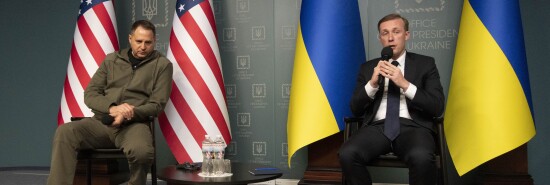
A Republican-controlled House isn’t going to abandon Ukraine for Russia
Tom Rogan
Video Embed
While control of the Senate remains an open question, it seems likely that Republicans will hold a majority in the House of Representatives when the new Congress takes office on Jan. 3. What might that mean for U.S. relations with Russia?
Much media attention has been given to comments from Rep. Kevin McCarthy (R-CA), who stands to become speaker of the House if Republicans do win a House majority. McCarthy warned last month that Americans don’t want their elected representatives “to write a blank check to Ukraine.” Alongside skepticism of U.S. support for Ukraine from other prominent Republicans, notably Sen.-elect J.D. Vance (R-OH), some believe U.S. aid for Ukraine may soon come to an abrupt end.
Such expectations are exaggerated.
WHAT SHOULD US STRATEGIC OBJECTIVES IN UKRAINE ACTUALLY BE?
First off, the consensus of the House Republican Party remains deeply skeptical of Russia and favorable toward Ukraine. McCarthy has admitted as much by rowing back his October comments and pledging continued U.S. support for Ukraine. Recently outlining their policy agenda for the new Congress, influential voices in the Republican Study Committee and House Armed Services Committee leadership identify Russia as a top U.S. adversary. And, as with the vast majority of Republican senators-elect, Senate Minority Leader Mitch McConnell (R-KY) is supportive of Ukraine. Indeed, although many of the media appear to have forgotten as much, it was Republicans, not Democrats, who originally sought to end Vladimir Putin’s Nord Stream II energy pipeline and send greater quantities of more capable weapons to Ukraine. Republicans are also far more skeptical than Democrats of prospective cooperation with Russia on nuclear arms control and the Iran nuclear accord, for example.
Pertaining to Ukraine, the Republican focus in 2023 is likely to center on three issues. First, scrutinizing U.S. financial aid more closely to avoid its being lost to corruption (a legitimate concern). Second, pressuring European powers to carry their share of the burden in Ukraine’s support. And third, ensuring U.S. munition stocks expended in Ukraine are rapidly replenished (reflecting readiness concerns over a possible conflict with China). The top line, however, is that a clear majority of Republicans in the 118th Congress will be inclined to support Ukraine for the same reason that a clear majority of Republicans in the 117th Congress did. Namely, they believe Ukraine’s democratic right to exist should not be extinguished by a Russian imperium that seeks to shred the post-1945 international order.
Nor will the Republican consensus that China now poses the preeminent threat to U.S. national security mean some kind of GOP push for detente with Putin. Instead, concerns over China will likely inform moves to increase military and security-related investments. Even if new military capabilities are rightly prioritized for the Pacific, at the margin, increased U.S. military power will translate to increased U.S. deterrent power against Russia.
So anyone hoping for some kind of alliance between Kevin McCarthy and Nikolai Patrushev will be disappointed.
CLICK HERE TO READ MORE FROM THE WASHINGTON EXAMINER
